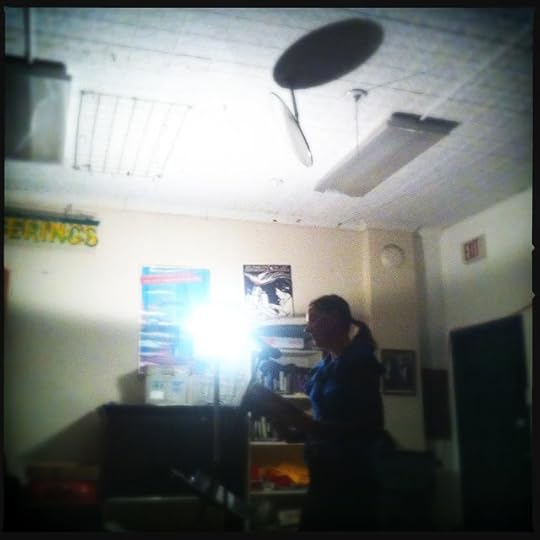A Certain Friday Night in Albany, New York

Coming into the middle of the first third of the reading, I am hit with a story, one slowly told and with no perceptible point. Things happen. The end. But things don't even happen. We are told they are. The narrator tells us people believe he is dangerous without demonstrating his danger.
I shift in my seat. I've been here only a few minutes.
The second reader was a musician for many years. Now, a poet, teacher, student. He says he will "read from a number of my favorite poets." He says, "I only brought lady poets." I cringe. Then he says "lady poet" again, in case I missed it the first time. He reads the first poem to us. Declaims it. He stops to tell us: "Poetry works on a spiritual level other writing can't." I don't believe it. I want evidence. He reads the poem he says is his mission statement for the night. It is a dead poem. It arrives dead. He buries it. He reads another poem, the title of which may be a reference to Aldous Huxley or to the Doors, or he doesn't know the reference. The poem includes the line "feeling safe in the rapist's embrace." He reads the poem jauntily. I bow my head slightly and rest it on the tips of my forehead, preparing myself to continue, quietly, in my chair against a wall. He reads Sylvia Plaths' "Tale of a Tub." Also jauntily. He reads everything the same way. Maybe we all do, and I simply haven't noticed.
His reading continues. He says, "I told myself I'd never write a hangover poem," just before reading us his hangover poem. This poem, all of them, are filled with adjectives. I have no aversion to adjectives, but there are so many that there is no poem; adjective-noun, adjective-noun, adjective-adjective-noun, goes the poem. The pattern seems like prosody, but the poem is empty of poetry. He tells us that the next poem needs some explanation, and gives an explanation that the poem also gives, but the one he gives us first is much longer than the poem itself. We need a library's worth of explanation for a line's worth of poem. His next poem with a one-word abstract noun as a title, and says, "I learned today that it will be in the Something Review, a pretty good little magazine, am I right?" I hold myself in place. There is another poem after this, then he ends with "Thanks for listening, guys." I am empty, like one of his poems.
Between the first and the second and the second and the third reader, I hear the intros. These are beautiful, read by James Belflower. Short bios followed by a beautiful reading of a poem that the two organizers have fashioned out of the individual poet's work. And his voice is beautiful, deep but rich, and always in motion, always changing its stance. At this point, his is the best reading by far.
Then Anna Elena Ayre appears. She is tall, with a strong nose, more striking a presence than the men who preceded her. She begins with poems from a pronoun series: "He," "She," and "I." Each line of each poem ends with the pronoun that is its title. This causes as strange sonic discomfort, but good discomfort. We are thrown off. Almost every end of a line has to move to a verb, but instead we are stopped. And every poem has an AAAAAAAAAAA rhyme scheme. I begin to write down lines to remember: "is is is was was," which is fully "says is is is was was were you he." Her language is inventive, disjunctive, urgent. She reads with a voice that trips and rolls over itself as the words do the same: "word a word collapsible i," "press body against body to feel strain i," and "i / can't think to think what that thought is." By the end of this poem, her i's are gasps, orgasmic, coming, done.
I am awake again. Those, I later discover, were from her chapbook "are me."
Next, she reads from her "first book with a spine." She begins with letters written to William Carlos Williams about his "Kora in Hell." The poems are numbered. She reads "six." "bloodoranges interbreedable citrus" and "snowless mouth." (With the book in hand, Faceless Names: Two Books of Letters, I discover she has misspelled this word: "pairingknife.") She reads "nine": "the scare is invisible," "best words are written beasts," "thumbs in your anus," "your third eye is color-blind."
She reads from the second section of the book, "Nameless Mail." They are letters written to a grandmother she never knew: "one can live off air and light on mesa land." At this point the older woman two seats to the left of me starts snoring loudly. After a while, Anna realizes it and looks around. The man just to my right says something like "It is what you think." We all laugh loudly. When the laughter dies down, we hear the snoring again. Anna looks at the woman and says, "It's kinda sweet." And she finishes reading her poems to Evie—"lost in rhetorical abandonment.
It was a good night.
ecr. l'inf.
Published on January 22, 2012 20:27
No comments have been added yet.



